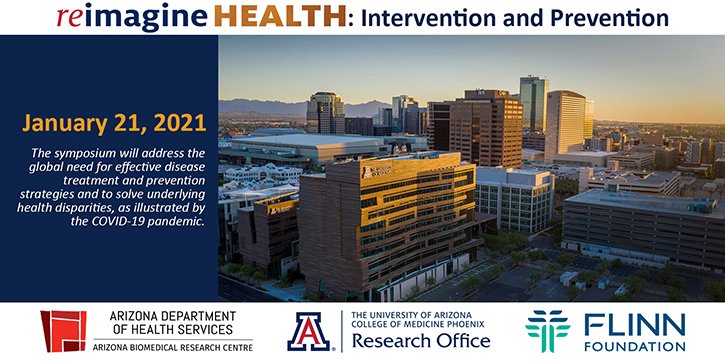
Symposium Objective
The 3rd Annual reimagine Health Research Symposium focused on current topics in the areas of Intervention and Prevention of important diseases that are impacting humankind. It emphasized approaches for a variety of diseases and crises — including COVID-19, cardiovascular disease, cancer, opioid addiction and the challenge of needing to develop novel antibiotics. Attendees learned from and engaged with leading experts who presented and discussed contemporary treatment and prevention strategies in the areas of drug discovery, vaccine development, addiction management, the use of artificial intelligence, as well as ethical and social factors contributing to these approaches.
Sponsors
The reimagine Health Research Symposium is co-sponsored and planned by the Arizona Biomedical Research Centre, the University of Arizona College of Medicine – Phoenix Research Office and the Flinn Foundation.
Keynote Speaker
Novel Antibody Platforms and Structure-Based Vaccine Design for AIDS, Influenza and COVID
Gary Nabel, MD, PhD
President and CEO, ModeX Therapeutics
Former Chief Scientific Officer, Sanofi
Former Director, Vaccine Research Center, NIAID, NIH
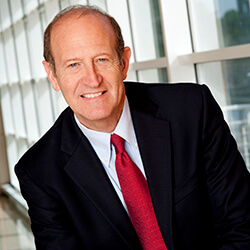 Dr. Gary J. Nabel is currently the president and CEO for ModeX Therapeutics. Formerly, he was the chief scientific officer, Global Research and Development at Sanofi. In addition to serving as senior vice president for the company, Dr. Nabel also oversaw the Breakthrough Lab — which developed the first trispecific antibodies now in development for HIV as published in Science, as well as cancer immunotherapies and novel vaccines.
Dr. Gary J. Nabel is currently the president and CEO for ModeX Therapeutics. Formerly, he was the chief scientific officer, Global Research and Development at Sanofi. In addition to serving as senior vice president for the company, Dr. Nabel also oversaw the Breakthrough Lab — which developed the first trispecific antibodies now in development for HIV as published in Science, as well as cancer immunotherapies and novel vaccines.
An author of more than 450 scientific publications, Dr. Nabel joined Sanofi in 2012 from the National Institutes of Health, where he served as director of the Vaccine Research Center (VRC) since 1999; during which time, he provided overall direction and scientific leadership of the basic, clinical and translational research activities and guided development of novel vaccine strategies against HIV, universal influenza, Ebola and emerging infectious disease viruses. His work encompasses basic mechanisms of HIV gene activation, structure-based vaccine design and immunotherapy.
Dr. Nabel graduated magna cum laude from Harvard College in 1975 and continued his graduate studies at Harvard, completing his PhD in 1980 and his MD two years later; this was followed by a postdoctoral fellowship with David Baltimore at the Whitehead Institute. In recognition of his expertise at the forefront of virology, immunology, gene therapy and molecular biology, Dr. Nabel was elected to the National Academy of Medicine in 1998. Among his many other honors, Dr. Nabel received the Amgen Scientific Achievement Award from the American Society for Biochemistry and Molecular Biology, the Health and Human Services Secretary’s Award for Distinguished Service and is a fellow of the American Association of Physicians, as well as the American Academy of Arts Sciences.
Symposium Speakers
Regina Barzilay, PhD
Delta Electronics Professor, Department of Electrical Engineering and Computer Science, Massachusetts Institute of Technology
Topic: AI in Antibiotic Discovery and Oncology Drug Development
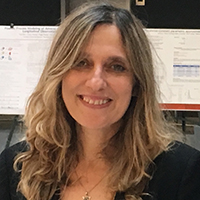 Dr. Barzilay is a professor in the Department of Electrical Engineering and Computer Science and a member of the Computer Science and Artificial Intelligence Laboratory at the Massachusetts Institute of Technology. Her research interests are in natural language processing.
Dr. Barzilay is a professor in the Department of Electrical Engineering and Computer Science and a member of the Computer Science and Artificial Intelligence Laboratory at the Massachusetts Institute of Technology. Her research interests are in natural language processing.
Currently, Dr. Barzilay is focused on bringing the power of machine learning to oncology. In collaboration with physicians and her students, she is devising deep learning models that utilize imaging, free text and structured data to identify trends that affect early diagnosis, treatment, and disease prevention. Prof. Barzilay is poised to play a leading role in creating new models that advance the capacity of computers to harness the power of human language data.
Dr. Barzilay is a recipient of various awards — including the MacArthur Fellowship, NSF Career Award, the MIT Technology Review TR-35 Award, Microsoft Faculty Fellowship and several Best Paper Awards in top NLP conferences. In 2017, she received a MacArthur fellowship, an ACL fellowship and an AAAI fellowship. Prof. Barzilay received her MS and BS from Ben-Gurion University of the Negev. Regina Barzilay received her PhD in Computer Science from Columbia University and spent a year as a postdoctoral fellow at Cornell University.
Julie E. Bauman, MD, MPH
Deputy Director, University of Arizona Cancer Center, Chief of Hematology/Oncology, Professor of Medicine, and Associate Director of Translational Research, University of Arizona Cancer Center
Topic: Cancer Immunotherapy: Coming of Age in the PD-1 Era
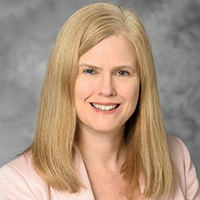 Dr. Bauman is a professor of Medicine, chief of Hematology/Oncology and the deputy director at the University of Arizona Cancer Center (UACC). She received her MD/MPH degree from Tufts University, earning election to Alpha Omega Alpha and the MD/MPH Academic Achievement Award in 1999. She completed her Internal Medicine Residency at University of Utah in 2003 and Medical Oncology Fellowship at University of Washington in 2006, where she was Chief Fellow. Her education and training, focused at the intersection of oncology and public health, resulted in unique expertise in clinical trials for cancer prevention or treatment. Dr. Bauman is a Tucson local; she graduated from Salpointe HS in 1985.
Dr. Bauman is a professor of Medicine, chief of Hematology/Oncology and the deputy director at the University of Arizona Cancer Center (UACC). She received her MD/MPH degree from Tufts University, earning election to Alpha Omega Alpha and the MD/MPH Academic Achievement Award in 1999. She completed her Internal Medicine Residency at University of Utah in 2003 and Medical Oncology Fellowship at University of Washington in 2006, where she was Chief Fellow. Her education and training, focused at the intersection of oncology and public health, resulted in unique expertise in clinical trials for cancer prevention or treatment. Dr. Bauman is a Tucson local; she graduated from Salpointe HS in 1985.
Cancer Focus: Dr. Bauman is an internationally recognized expert in head and neck cancer (HNC). She is funded by the National Cancer Institute (NCI) and the V Foundation to conduct clinical trials to prevent or treat HNC. She leads a broad portfolio of trials evaluating novel immunotherapies in patients with HNC. She is the co-principal investigator of the UACC Chemoprevention Network, which tests novel cancer prevention agents — such as a broccoli-based dietary supplement to reduce tobacco carcinogenesis or HPV vaccination schedules to impart immunity. Dr. Bauman received the NCI Clinical Investigator Team Leadership Award in 2011. She sees patients with HNC and thyroid cancer at the UACC clinic at Banner-University North.
Jolene Bowers, PhD
Research Assistant Professor, Pathogen and Microbiome Division, TGen
Topic: Translating COVID-19 Genomics into Public Health Action
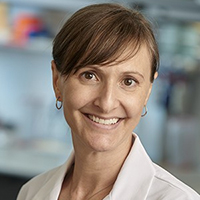 Dr. Bowers is a research assistant professor at the Translational Genomics Research Institute (TGen) North, the Pathogen and Microbiome Division of TGen. Her work centers around development of next-generation molecular tools for clinical diagnostics for infectious disease, antibiotic resistance detection and for epidemiological surveillance of pathogens. Dr. Bowers’ team also works closely with public health agencies at the local, state and national levels to apply cutting edge tools to investigate outbreaks and conduct epidemiological studies in support of these agencies.
Dr. Bowers is a research assistant professor at the Translational Genomics Research Institute (TGen) North, the Pathogen and Microbiome Division of TGen. Her work centers around development of next-generation molecular tools for clinical diagnostics for infectious disease, antibiotic resistance detection and for epidemiological surveillance of pathogens. Dr. Bowers’ team also works closely with public health agencies at the local, state and national levels to apply cutting edge tools to investigate outbreaks and conduct epidemiological studies in support of these agencies.
Dr. Bowers joined TGen North in 2007, and received her PhD from Northern Arizona University in 2016, focusing on the evolution and dissemination of a carbapenem resistant Enterobacteriaceae (CRE) known as Klebsiella pneumoniae ST258 and identifying genomic markers for identification and characterization of K. pneumoniae in complex specimens. Her dissertation work has served as a template for several studies at TGen North.
Julie E. Bauman, MD, MPH is a Professor of Medicine, Chief of Hematology/Oncology and the Deputy Director at the University of Arizona Cancer Center. She received her MD/MPH degree from Tufts University, earning election to Alpha Omega Alpha and the MD/MPH Academic Achievement Award in 1999. She completed Internal Medicine Residency at University of Utah in 2003 and Medical Oncology Fellowship at University of Washington in 2006, where she was Chief Fellow. Her education and training, focused at intersection of oncology and public health, resulted in unique expertise in clinical trials for cancer prevention or treatment. Dr. Bauman is a Tucson local; she graduated from Salpointe HS in 1985
Tom Broker, PhD
Professor, Department of Biochemistry and Molecular Genetics, University of Alabama at Birmingham School of Medicine
Topic: 3D-Organotypic Raft Cultures for Anti-HPV Drug Discovery and Characterization
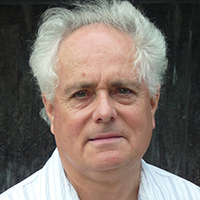 Dr. Broker received his BA in Chemistry and Biology from Wesleyan University (1966) and PhD in Biochemistry from Stanford University (1972) in the laboratory of professor Robert Lehman, studying the molecular and genetic pathways of DNA recombination in bacteriophage T4 using electron microscopy. Tom was a postdoctoral fellow with professor Norman Davidson at Caltech, where he invented the use of Avidin-Biotin Complexes to label DNA, RNA, proteins, and matrices to purify biomolecules or tag them for microscopic visualization.
Dr. Broker received his BA in Chemistry and Biology from Wesleyan University (1966) and PhD in Biochemistry from Stanford University (1972) in the laboratory of professor Robert Lehman, studying the molecular and genetic pathways of DNA recombination in bacteriophage T4 using electron microscopy. Tom was a postdoctoral fellow with professor Norman Davidson at Caltech, where he invented the use of Avidin-Biotin Complexes to label DNA, RNA, proteins, and matrices to purify biomolecules or tag them for microscopic visualization.
In 1975, he joined the Cold Spring Harbor Laboratory as laboratory chief of the Electron Microscopy Section. Tom and his wife Louise Chow investigated human adenovirus genome organization by using the EM R-loop method for mapping the viral transcripts. In 1977, they and their collaborators discovered split genes and RNA splicing.
The lab characterized the alternative selection of transcriptional promoters and alternative patterns of 3’-end determination and RNA splicing. Broker and Chow became tenured Senior Scientists in 1979. They moved to the University of Rochester in 1984 and relocated to the University of Alabama at Birmingham in 1993 as professors.
Their lab has been investigating the natural history and biology of the human papillomaviruses since 1980. In 1986, Broker invented the use of PCR for detecting and genotyping HPV infections in clinical specimens, now marketed by Roche Diagnostics. Central to the HPV research program for over 30 years are three-dimensional human squamous epithelia established to interrogate virus-host tissue interactions and the entire productive infection cycle, as well as neoplastic progression to cancers. Based on this rational identification of targets, the lab is focusing on anti-HPV drug discovery and validation, with several agents now entering clinical trials. A related priority is advocacy for effective Global Public Health Action against HPV diseases. Broker was the founding president of the International Papillomavirus Society, currently planning for its 34th Conference.
Marilyn Glassberg, MD
Chief, Division of Pulmonary Medicine, Critical Care and Sleep Medicine, Professor of Internal Medicine, University of Arizona College of Medicine – Phoenix, and Physician Executive Director, Banner Health University Lung Institute
Topic: COVID-19 – Searching for Treatments and Robust Outcomes from Clinical Trials
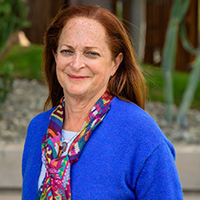 Dr. Marilyn Glassberg is the division chief of Pulmonary Medicine, Critical Care and Sleep Medicine, the vice chair for Diversity and Inclusion, as well as the senior director of Clinical Research for Strategy and Growth for the Department of Internal Medicine at the University of Arizona College of Medicine – Phoenix and Banner – University Medical Center Phoenix. She is board-certified in pulmonary medicine and is an internationally recognized expert in interstitial and rare lung diseases. She has conducted NIH, industry sponsored and investigator-initiated clinical trials in patients with idiopathic pulmonary fibrosis (IPF), pulmonary hypertension and lymphangioleiomyomatosis.
Dr. Marilyn Glassberg is the division chief of Pulmonary Medicine, Critical Care and Sleep Medicine, the vice chair for Diversity and Inclusion, as well as the senior director of Clinical Research for Strategy and Growth for the Department of Internal Medicine at the University of Arizona College of Medicine – Phoenix and Banner – University Medical Center Phoenix. She is board-certified in pulmonary medicine and is an internationally recognized expert in interstitial and rare lung diseases. She has conducted NIH, industry sponsored and investigator-initiated clinical trials in patients with idiopathic pulmonary fibrosis (IPF), pulmonary hypertension and lymphangioleiomyomatosis.
Dr. Glassberg earned her MD at the University of Miami School of Medicine and completed her residency at the University of Miami Affiliated Hospitals in the Department of Internal Medicine. Dr. Glassberg also received her fellowship in Pulmonary Medicine at the University of Miami Affiliated Hospitals.
William Holland, MD
Vice President of Care Management and Chief Medical Informatics Officer, Banner Health
Topic: Banner System Response to the COVID-19 Pandemic
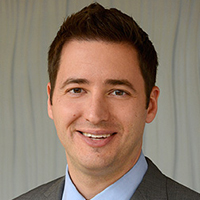 Dr. Will Holland is the vice president of Care Management and chief medical informatics officer for Banner Health. He provides system level, transformational leadership to support integrated care delivery, drive clinical outcomes, manage risk for populations, support the Quadruple Aim and engage the consumer. His responsibilities include system quality, safety, infection prevention, regulatory, clinical device evaluation, physician leadership development, informatics, MACRA preparedness and clinical process improvement.
Dr. Will Holland is the vice president of Care Management and chief medical informatics officer for Banner Health. He provides system level, transformational leadership to support integrated care delivery, drive clinical outcomes, manage risk for populations, support the Quadruple Aim and engage the consumer. His responsibilities include system quality, safety, infection prevention, regulatory, clinical device evaluation, physician leadership development, informatics, MACRA preparedness and clinical process improvement.
Dr. Holland earned a BS in Microbiology, magna cum laude from Texas A&M University, after which he attended Baylor College of Medicine in Houston, TX. In 2004, Dr. Holland completed his residency training in Family Medicine at the Banner Good Samaritan Family Medicine Residency in Phoenix, Arizona, and served as chief resident from 2003-2004. He joined the Medical Informatics Department at Banner in February 2010 and is a 2010 Medical Informatics MBL National Library of Medicine course fellow. He is board-certified in both family medicine and clinical informatics.
Sam Lee, PhD
President, Cocrystal Pharma Inc.
Topic: Application of Structure-Based Drug Design Platform Technology for Developing Broad-Spectrum COVID-19, Influenza and HCV Antivirals
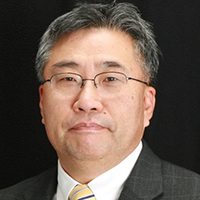 Dr. Lee is president and co-founder of Cocrystal Pharma Inc., Bothell, Washington since 2008. Cocrystal Pharma Inc. (NASDAQ: COCP) is developing novel small molecule antivirals for the treatment of COVID-19, Influenza, Norovirus and Hepatitis C.
Dr. Lee is president and co-founder of Cocrystal Pharma Inc., Bothell, Washington since 2008. Cocrystal Pharma Inc. (NASDAQ: COCP) is developing novel small molecule antivirals for the treatment of COVID-19, Influenza, Norovirus and Hepatitis C.
He served on the Board of Directors of Cocrystal Discovery Inc., from 2007 to 2014. Prior to his work at Cocrystal, he managed anti-infective, oncology and inflammation programs for eight years at Icos Corporation, and was also responsible for bringing unique protein crystallography and structural screening technologies to Icos research.
Also, he played a key role in developing phosphoinositide 3-kinase (PI3K) delta inhibitors at Icos, which ultimately yielded an FDA approved product. Prior to Icos, he founded and was CEO of Viral Assays, Inc., in Cupertino, CA, licensing patented technologies to major pharmaceutical companies. He received his PhD from the University of Notre Dame and completed postdoctoral training at the Department of Biochemistry at Stanford Medical School.
Purnima Madhivanan, MBBS, MPH, PhD
Associate Professor, Health Promotion Sciences Department, UArizona Mel and Enid Zuckerman College of Public Health
Topic: Addressing HPV Vaccine Access and Hesitancy – Public Health or Human Rights
 Dr. Madhivanan is an associate professor in Health Promotion Sciences at the Mel & Enid Zuckerman College of Public Health at University of Arizona, Tucson. She was trained in India and has an MPH and PhD in Epidemiology from the University of California, Berkeley. She completed her postdoctoral training in Clinical Trials in 2010. She is the director of the Global Health Training Program at University of Arizona and serves as one of the PIs for the Global Health Equity Scholar (GHES) consortium in collaboration with Stanford, Yale and University of California, Berkeley. She also directs the Fogarty-Fulbright Fellowship program for University of Arizona
Dr. Madhivanan is an associate professor in Health Promotion Sciences at the Mel & Enid Zuckerman College of Public Health at University of Arizona, Tucson. She was trained in India and has an MPH and PhD in Epidemiology from the University of California, Berkeley. She completed her postdoctoral training in Clinical Trials in 2010. She is the director of the Global Health Training Program at University of Arizona and serves as one of the PIs for the Global Health Equity Scholar (GHES) consortium in collaboration with Stanford, Yale and University of California, Berkeley. She also directs the Fogarty-Fulbright Fellowship program for University of Arizona
For the past 20 years, her research has focused on disadvantaged populations, elucidating the dynamics of poverty, gender and the environmental determinants of health, in particular the impact on women and children living in rural and limited resource communities. She has worked in India, Peru, Haiti, Dominican Republic, Colombia and in the US.
To situate her research close to the communities she serves, she established a clinical site in Mysore, India in 2005 while completing her PhD dissertation. For over a decade, the Prerana Women’s Health Initiative has delivered low-cost, high-quality reproductive health services to 50,000 low-income women living in Mysore. Offering a full-service clinic, molecular laboratory and active affiliations with several major tertiary care hospitals, the site is recognized as a research and training site by NIH for Global Health.
Grant McFadden, PhD
Director and Professor, Center for Immunotherapy, Vaccines and Virotherapy, Biodesign Institute, Arizona State University
Topic: Virotherapy in Arizona
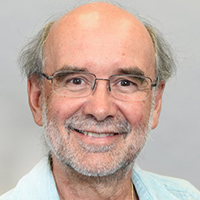 Dr. McFadden received a PhD in Biochemistry in 1975 from McGill University. He has held previous tenured faculty positions at the University of Alberta, Western University and the University of Florida. He was also a visiting sabbatical professor at Harvard Medical School.
Dr. McFadden received a PhD in Biochemistry in 1975 from McGill University. He has held previous tenured faculty positions at the University of Alberta, Western University and the University of Florida. He was also a visiting sabbatical professor at Harvard Medical School.
He was awarded a Canada Research Chair (Tier I) in Molecular Virology in 2001 and, in 2005, he was awarded a Howard Hughes Medical Institute International Scholarship. He was inducted as a fellow of the Royal Society of Canada in 2004, the Canadian Academy of Health Sciences in 2005 and the American Academy of Microbiology in 2007.
Dr. McFadden is currently a professor at Arizona State University and is the director of the Biodesign Center for Immunotherapy, Vaccines and Virotherapy (B -CIVV). He was the co-editor-in-chief of the journal PLoS Pathogens until 2020; is currently a senior Eeditor at Molecular Therapy-Oncolytics; and was the president of the American Society for Virology 2015-16.
Dr. McFadden's lab pioneered the field of viral immune subversion (also called "anti-immunology"), and is credited with the discovery of a wide spectrum of virus-derived inhibitors of the immune system. His lab also investigates host-virus tropism, as well as the deployment of poxviruses for oncolytic virotherapy for the treatment of cancer — particularly with a rabbit-specific poxvirus called myxoma virus (MYXV). He is also currently developing human clinical trials that exploit virotherapy with MYXV to treat various cancers, for which he has co-founded a new biotech company called OncoMyx Therapeutics. To date, McFadden has published over 380 scientific papers and reviews.
Terrence Stull, MD
Senior Vice President of Research and Chief Research Officer of the Phoenix Children's Hospital Research Institute, and Professor, Child Health, University of Arizona College of Medicine – Phoenix
Topic: Reimagining Vaccines: Bacterial Vaccine Polypeptides
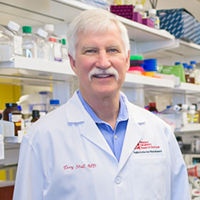 Dr. Stull has overall executive management responsibility for developing, coordinating and stimulating research activity, as well as ensuring that our research infrastructure supports our investigators. His role includes enhancing external funding and ensuring compliance with all applicable laws and regulations, and he works with leaders across Phoenix Children's Hospital to recruit and develop scientific talent. Dr. Stull will work with our community and academic partners to build pediatric research not only at Phoenix Children's but across the region.
Dr. Stull has overall executive management responsibility for developing, coordinating and stimulating research activity, as well as ensuring that our research infrastructure supports our investigators. His role includes enhancing external funding and ensuring compliance with all applicable laws and regulations, and he works with leaders across Phoenix Children's Hospital to recruit and develop scientific talent. Dr. Stull will work with our community and academic partners to build pediatric research not only at Phoenix Children's but across the region.
Dr. Stull served as the chair of Pediatrics at the University of Oklahoma from 1994 to 2016, and he built a superb department that excels in providing care, teaching and research. He has maintained a funded research laboratory throughout his career, and he moved his personal research mission to Phoenix Children's.
Dr. Stull graduated from the University of Alabama in Birmingham School of Medicine. He then completed a pediatric residency at Stanford and a pediatric infectious disease fellowship at Seattle Children’s Hospital. Dr. Stull is a member of various professional societies, including the American Pediatric Society, Society for Pediatric Research and Infectious Disease Society of America. He has participated in research throughout his career, is a frequent invited speaker and has published more than 200 articles.
Tricia Wright, MD, MS
Professor, Obstetrics, Gynecology & Gynecologic Subspecialties, University of California San Francisco
Topic: Addiction Medicine
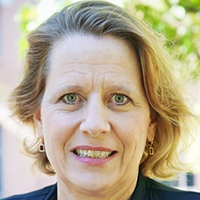 Dr. Wright is a professor of Clinical Medicine in the Department of Obstetrics, Gynecology and Reproductive Health at the University of California, San Francisco. Previously, she was at the University of Hawaii and founded the Path Clinic — a perinatal clinic specializing in the care of pregnant and parenting women with substance use disorders. She is board-certified in both obstetrics and gynecology, as well as addiction medicine; and she is a fellow of the American College of Obstetrics and Gynecology and a distinguished fellow of the American Society of Addiction Medicine. She has published multiple papers on pregnancy and addiction, as well as a textbook, Opioid Use Disorders in Pregnancy, published in 2018 by Cambridge University Press.
Dr. Wright is a professor of Clinical Medicine in the Department of Obstetrics, Gynecology and Reproductive Health at the University of California, San Francisco. Previously, she was at the University of Hawaii and founded the Path Clinic — a perinatal clinic specializing in the care of pregnant and parenting women with substance use disorders. She is board-certified in both obstetrics and gynecology, as well as addiction medicine; and she is a fellow of the American College of Obstetrics and Gynecology and a distinguished fellow of the American Society of Addiction Medicine. She has published multiple papers on pregnancy and addiction, as well as a textbook, Opioid Use Disorders in Pregnancy, published in 2018 by Cambridge University Press.
Dr. Wright completed her undergraduate degree in Biological Sciences from Stanford University and her MD from the University of Michigan. She completed her residency in Obstetrics and Gynecology from the University of New Mexico and obtained a master’s degree in Clinical Research from the University of Hawai‘i.
Contact
For questions about the symposium or to become symposium sponsor, please contact the Research Office.
Planning Committee
- Paul Boehmer, PhD – Committee Chair, University of Arizona College of Medicine – Phoenix.
- Jennifer Botsford, MSPH – Program Director, Arizona Biomedical Research Centre.
- Pamela Garcia-Filion, PhD, MPH – Associate Research Scientist.
- Jonathan Lifshitz, PhD– Director, Translational Neurotrauma Research Program, University of Arizona College of Medicine – Phoenix.
- Maria Manriquez, MD, FACOG – Director, Pipeline Admissions Program and UME Addiction Medicine Education, University of Arizona College of Medicine – Phoenix.
- Mary O’Reilly, PhD – Vice President, Bioscience Research Programs, Flinn Foundation.
- Claire Pascavis, MBA – Program Coordinator, Sr., University of Arizona College of Medicine – Phoenix.
- Bernadine Sadauskas, MS, CRA – Director of Operations, University of Arizona College of Medicine – Phoenix.
- Victor Waddell, PhD – Executive Director, Arizona Biomedical Research Centre.
- Ting Wang, PhD – Associate Professor and Scientific Director, Pulmonary and Endothelial Research Core, University of Arizona College of Medicine – Phoenix.


